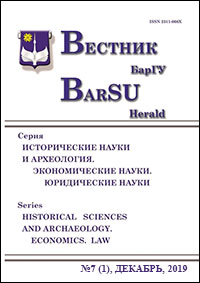PRINCIPLES OF PROTECTION OF THE ORTHODOX CHURCH LEGAL STATUS INTHE RUSSIAN EMPIRE LEGISLATION IN THE LATE XIX — EARLY XX CENTURY
Keywords:
Orthodox Church; Orthodoxy; tolerance; Code of Criminal and Correctional Penalties; non-Christian Religions; Holy Synod; the spiritual consistory; mixed marriagesAbstract
The article considers the legal basis for maintaining the dominant position of the Orthodox Church in the Russian
Empire and ensuring the principle of tolerance toward other religions recognized in the state. The norms of the Penal
Code of 1885, the main codified normative act of criminal law, were intended to protect the exclusive right of the Orthodox
Church to conduct religious propaganda among followers of other religions. This task was achieved by establishing
a ban on the transition from Orthodoxy to other Christian and non-Christian religions for Orthodox people, as well as various
restrictions on the conduct of public services and processions by non-Orthodox and non-Christian churches. The Penal
Code of 1885 also regulated the upbringing of children in mixed marriages in which the spouses belonged to different faiths.
Nevertheless, in general, the experience of state-legal regulation of inter-confessional relations at this historical stage was
invariably based on the principle of religious tolerance laid down in the time of the christening of Russia.
Ref.: 15 titles.
Published
Issue
Section
License
Copyright (c) 2023 Вестник БарГУ Серия "Исторические науки и археология. Экономические науки. Юридические науки"
Это произведение доступно по лицензии Creative Commons «Attribution-NonCommercial» («Атрибуция — Некоммерческое использование») 4.0 Всемирная.
Авторы сохраняют за собой право заключать определенные договорные соглашения, касающиеся неисключительного распространения опубликованной версии работы (например, размещать ее в институциональном репозитории, публикация в книге) со ссылкой на ее первоначальную публикацию в этом журнале.





